Copyright ©2008 PopEntertainment.com. All rights reserved.
Posted:
January 18, 2008.
With
the ongoing conflict in the Middle East there have been rumblings that
eventually the United States may have to reinstate the military draft. The
film Day Zero takes this one step further Ė imagining what will
happen after this occurs.
Day Zero
focuses in on three New York-area friends who receive their draft notices.
They have thirty days to get their lives in order before being shipped off to
war.
George Rifkin (Chris Klein of American Pie) is a well-off lawyer
whose thriving career and terminally ill wife (Ginnifer Goodwin) have him
desperate to pull any strings to get out of the obligation.
Aaron Feller (Elijah Wood of Lord of the Rings) is the most sensitive
of the group, a neurotic writer who had a popular first book but seems
unable to follow it up. Once his draft notice comes in, Aaron snaps, diving
into a world of sex-for-sale, alcohol, drugs, tattoos and skinheads.
James Dixon Ė played by Jon Bernthal, late of the sitcom The Class Ė
is sort of the protector of the group. Though on a lower economic scale Ė
he is working as a cabbie Ė he is the strongest and possibly most principled
of the friends. Dixon actually believes that the cause is just; however he
finds he does have something to lose when right before he is supposed to
leave he falls for a pretty local schoolteacher (Elisabeth Moss of The
West Wing.).
Bernthal has been making his way into the mainstream of show biz in the
decade he has been working in TV and film. He has been in movies like
World Trade Center and Tony ĎNí Tinaís Wedding and has appeared
in TV series such as CSI: Miami, Law and Order: SVU, How I Met Your
Mother, Boston Legal and Without A Trace. In 2006-2007 he was a
breakout character in the extremely hyped but ultimately short-lived sitcom
The Class.
A few days before Day Zero was released to theaters; Bernthal was nice
enough to give us a call to discuss the film.
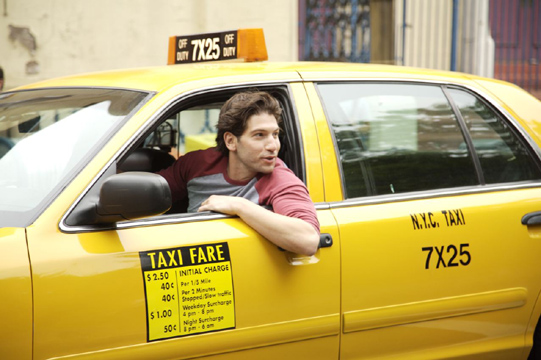 Day
Zero has a very controversial subject matter. What was it about the
script that appealed to you?
Day
Zero has a very controversial subject matter. What was it about the
script that appealed to you?
The
character. I read the script and this was something I felt that I had to
do. As soon as I put the script down, I was on a mission. I was writing
letters to the producer and to the writer begging for an audition. You
know, the way the state of affairs is in Hollywood in this day and age Ė
guys like me donít really get to play lead roles in moviesÖ when youíre
starting out like I am. I just knew that I had to play this part. I really
wasnít going to take no for an answer. I pretty much did everything but
kick down their doors and force my way into the thing. (chuckles)
As soon as I put the script down I knew I had to do it.
Between this film and
World Trade Center you
have been in two very dramatic films which revolve around Middle East terror
and how it impacts us in the US. Now I know Iím stretching here a bit, but
I saw in your bio that you were born and raised in Washington DC.
Yes,
I was.
Was your family in government? Did growing up in the environment of the
city make this kind of political films more intriguing to you?
You
know, I donít know. Somebody else just asked me a question sort of like
that. Whether I feel like Iím more connected with 9/11 because I made these
moviesÖ or something like that. I think that what happened on 9/11 was the
defining moment for this generation. I feel like all Americans are
extremely connected with that. Itís a visceral gut connection that we
have. Itís in all of our blood. Itís changed all of our lives. The answer
to your question is that neither of my parents is in politics. But I knew
many people whose parents were. A lot of my friends have since gone on into
politics. So, yeah, I have a political conscience and I care deeply about
it. I donít necessarily know that growing up in DC made that happen.
Do you think the draft could ever really be reinstated? If it were, do you
think you could go if called to duty?
You
know, I would love to say that I would. Itís the type of question that you
canít really answer until youíre in the situation. There are countries in
the world [where] all people have to do military service. I think there is
something extremely positive about that. This country affords us
unbelievable opportunities. Iíve gotten so much out of this country.
People in other countries wouldnít believe the comfort and the opportunities
that we have. I think giving back is really important. Politically, if
there was a draft Ė if the military responsibility and burden was one that
was shared by all Ė I think that we would be a lot more careful and a lot
less quick to jump into things.
Dixon was
sort of supposed to be the character who voiced the pro-war side of the
debate. With the unpopularity of the war effort now was that a hard side to
take?
You
know, no, I donít think so, because I never really saw Dixon as a pro-war
guy. Heís a New Yorker. Like I said before Ė 9/11 had an enormous effect
on him. But, I think heís a pro-America guy. Heís a patriot. People often
mistake being a patriot for being a hawk. I think they are completely
different. He feels a duty to his country. Like I said before, this
country has afforded him a great opportunity. He cares deeply about his
responsibility to his country, as he cares deeply about his responsibility
to his friendships. When asked, he feels like he has to go. Being drafted
is not an invitation. Itís an order. Thatís where it lies, because so many
times in his life until then, he has been called on to do things and heís
answered that call. It affects him so deeply that his friends sort of want
to back out of it. Itís just something that sort of existed in their
friendship when they were young.
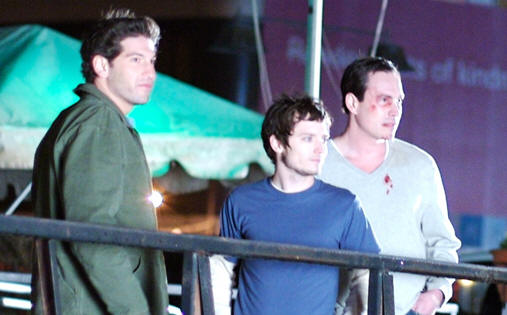 Dixon was
sort of the protector for the group. The three guys were probably never very
similar and over the years they became more and more different. Why do you
think that they stuck together?
Dixon was
sort of the protector for the group. The three guys were probably never very
similar and over the years they became more and more different. Why do you
think that they stuck together?
Well, I think like a lot of good friends that have known each other from
[when they were] kids, your friendships are really solidified when youíre
young. Iíd like to think in this group, Dixon, in a way, was the glue.
Dixon and these guys became friends very early on. They all went to a
magnet school. The whole idea of Stuyvesant [High School Ė in New York
City] is that it brings people from all sorts of socioeconomic and class
differences, just based on the fact that if you are talented enough and a
good enough student, you can go study there. Their friendships were made at
an early enough stage and it is Dixonís fierce loyalty to these guys that
got him into trouble. When he went and fought Rifkinís fight for him, they
sent him off to a juvenile detention center. Yes, they started to go their
different directions, but I feel like because Dixon made the sacrifice that
he did, these guys also have a fierce loyalty to him. Theyíve obviously
gone out in different directions and career paths, but this connection was
solidified when they were young and itís something that canít be broken. I
love the fact that this external circumstance of being drafted solidifies
them once again Ė puts them all in the proverbial same boat. Now they have
to deal with it. Itís been something that theyíve been dealing with since
they were young.
Although Aaronís list obviously was a little disturbed [the Elijah Wood
character makes a list of ten experiences he wants to have before going to
war Ė i.e. see a peep show, get a tattoo, visit a prostitute], if you had
thirty days of freedom left what things would you want to do?
HmmÖ Thatís a good question. I guess Iíd like to be around my family.
Play a lot of basketball. Hang out with my dog. Be in the ocean. Man, I
donít know. I donít know. Thatís a really good question. I would want to
enjoy myself and say everything that I could possibly say Ė to as many
people who I love as I could.
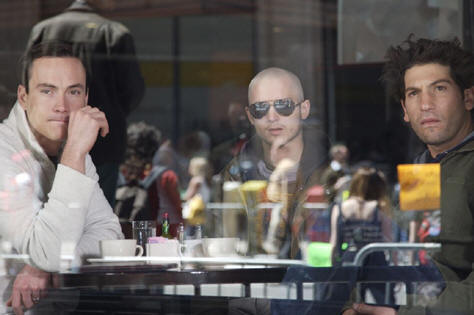 I
interviewed Elijah a couple of years ago and in real life he seems nice and
basically harmless. Was it surprising to see the places he went with his
character in the later scenes?
I
interviewed Elijah a couple of years ago and in real life he seems nice and
basically harmless. Was it surprising to see the places he went with his
character in the later scenes?
Oh
man, I was so excited to see it. Elijah isÖ youíre right; heís such an
extremely nice person. Heís such a professional. Itís just a dream to have
him on set. When we were in New York one day, we were filming and a guy
comes up to him Ė Elijah wasnít facing the guy Ė and the guy kind of slaps
Elijah in the back and asks for cigarette. He didnít realize who he was. I
immediately went to defend him, just because heís a small guy and thatís no
way to walk up to somebody. I sort of got in the guyís face. Once the guy
realized it was Elijah heís like, ĎĒOh, man, ElijahÖĒ Elijah hugged him and
all that. I was like, man, this guy is so freaking nice! Heís such a nice
guy. But, people get it confused. Heís an extremely talented actor. Heís
wonderful at what he does. Heís so nice and so professional and so
graciousÖ [but] I think there is no limit to the places that he can go. I
really believe in him as an actor.
You just mentioned filming in New York. There was one scene you did with
Chris Klein which appeared to be done during an actual anti-war rally.
Yeah, it sure was.
What that like to be an actor in the midst of a real life event?
Oh,
man, that was magic. It was completely unplanned. It just happened to be
near the location that we were shooting in. We just went guerrilla-style
and just started taking all the equipment into the subways, trying to get in
front of the march, set up our shots. We tried to get as much footage as we
could in that march. It was such an unbelievable thing to be able to play
off of. That energy was just amazing. It was weird, because that scene
with the three of us the day before we were supposed to go Ė it never really
made sense in rehearsals. We never really knew what that scene was about.
But then when it was about us watching this protest it made complete sense.
Itís just one of those movie-making magic events that really had resonance
for all of us.
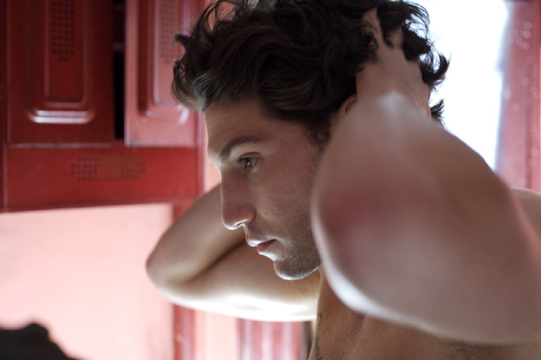 Despite the fact that your character was the one who believed that the cause
was just and that it was his responsibility to go, even you were given a
reason to question his service Ė meeting a woman. Why do you think it was
important that he suddenly have something to lose at home?
Despite the fact that your character was the one who believed that the cause
was just and that it was his responsibility to go, even you were given a
reason to question his service Ė meeting a woman. Why do you think it was
important that he suddenly have something to lose at home?
I
think he has been showing this undying loyalty to people his whole life.
Itís what I was talking about earlier with his friends. He feels the same
way with his country. That being said, Iím not sure heís ever felt what it
feels like to have that unwavering, undying loyalty back to him. He falls
in love with this woman. Not only does he fall in love with her, sheís a
good woman. She shows him the kind of loyalty heís been showing his friends
his whole life. Even though heís kept [his draft status] a secret from her,
she says to him, ďI love you and Iíll wait for you.Ē Thatís something that
just touched him in a way that he hadnít been touched before. That was
important because it put him in aÖ you know, the one thing about Dixon is he
has piece of mind, because he lives by a code. Everything makes sense to
him. He knows exactly how heís going to react to any situation. He runs it
through the priorities and the code with which he lives by and then makes a
decision. This just totally fucked everything up. This made everything go
haywire. He had to really make a decision, because his heart was being
pulled in two ways. He had to figure it out. Itís really an incredible
circumstance for [screenwriter] Rob [Malkani] to have come up with. Itís
wonderful. Itís one of the key obstacles, the key dilemmas of the movie.
It was interesting to me that despite the fact that your character was the
only one who was certain that he was right to be going to war; he never told
his new girlfriend Ė or even to a lesser extent the little girl in the
building who has a crush on him. Why do you feel he did that? Do you think
this was a little cruel on his part?
Yeah, I think that the scene with Lizzie Moss, where he finally does tell
her, itís the first time Dixonís ever found
himself in a situation where he didnít know what to do next. Heís just sort
of wavering in the wind. I think heís averse to all weakness. To waver to
him is to be completely weak. He was at a place of complete vulnerability
and weakness in front of her. He screwed up. He knew he had screwed up.
Look, it happened because he had met this wonderful girl and Ė you know
thereís a lot in the movie that didnít make it into the final cut,
obviously. There was a whole storyline with her brother. Her brother had
just been drafted, as well. It comes up in one of their first dates. It
sort of puts him up against the wall. He doesnít know whether to tell her
or not. You go through that journey with him, whether heís going to say it
or not. That doesnít come out in the movie. Thatís why I love that movie
so much. He fucked up. He screwed up. He should have said something and
he didnít.
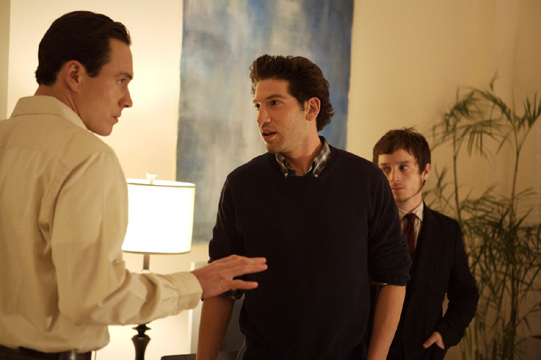 Iím a big fan of Elisabeth Moss as well. I have to admit during all of your
romantic scenes, I kept half-expecting the Secret Service to break in and
take you somewhere so President Bartlett could give you a stern lecture. (Moss
had played the President's daughter Zoey for several years on
The West Wing.)
Iím a big fan of Elisabeth Moss as well. I have to admit during all of your
romantic scenes, I kept half-expecting the Secret Service to break in and
take you somewhere so President Bartlett could give you a stern lecture. (Moss
had played the President's daughter Zoey for several years on
The West Wing.)
(He laughs heartily.)
Seriously, what was she like to work with?
A
dream, man. A dream. I fell in love with her. Our first
rehearsal I was in love. I was too big of a coward to send her flowers the next day, but I
fell in love with her, man. I couldnít wait to see her everyday on the
set. Sheís the best.
Last year you were a cast member of
The Class Ė which was
one of the big buzz shows of the season. How did you get the role and what
was that like to work on?
It
was great. I loved everybody I worked with. The writers were great. I
didnít think I had a chance in hell of being in that show. Itís not the
kind of acting that I normally do. The process of getting a network show,
you go through a crazy long process of all sorts of auditions. So, I think
one of the reasons I got it was because I thought there was no way I would
get it. It took all the pressure off myself. (laughs) I totally
didnít feel like I fit in that world at all.
Well, like you said, you havenít done all that much comedy. Do you find
comedy harder than drama?
No.
I mean, look, I studied acting for stage. I studied in Russia for a few
years. I have my MFA [Masters of Fine Arts] in acting here for stage. I
feel like Iím pretty comfortable with whatever comes my way. The characters
that that Iím super drawn to, the things that really excite me, are the
heavy dramatic, really masculine roles.
Email
us Let us
know what you
think.
Features
Return to the features page.